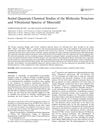TLDR The new wound dressing with minoxidil and dexamethasone could speed up healing and reduce scarring in rats.
The study aimed to develop a nanofiber dressing that elutes minoxidil and dexamethasone for wound healing in rats. Minoxidil is known to promote blood flow, which may speed up wound closure, while corticosteroids like dexamethasone can down-regulate healing. The developed dressings were characterized using SEM and FT-IR, and drug release was studied over 12 days. In the rat model, wounds treated with minoxidil showed good healing activity, likely due to the promotion of anagen hair growth phase, while dexamethasone was found to suppress collagen production and prevent scar formation. The study concludes that the minoxidil and dexamethasone-eluting wound dressing has the potential to be a new clinical treatment to accelerate wound healing and prevent scarring.
 6 citations
,
August 2014 in “Spectroscopy Letters”
6 citations
,
August 2014 in “Spectroscopy Letters” The analysis shows where minoxidil's atoms are likely to react and describes its electronic transitions and behavior with temperature changes.
 26 citations
,
May 2012 in “Pharmaceutical Development and Technology”
26 citations
,
May 2012 in “Pharmaceutical Development and Technology” PEVs effectively deliver minoxidil through skin.
 August 2023 in “Journal of Cosmetic Dermatology”
August 2023 in “Journal of Cosmetic Dermatology” Some plants like spinach, broccoli, and matcha may boost the effectiveness of the hair growth drug minoxidil.
 8 citations
,
April 2019 in “Dermatologic Therapy”
8 citations
,
April 2019 in “Dermatologic Therapy” Tretinoin boosts minoxidil's effect on hair loss by increasing enzyme activity.
5 citations
,
January 2018 in “Italian journal of dermatology and venereology” Minoxidil effectively stimulates hair growth in androgenetic alopecia.
 1 citations
,
January 2010
1 citations
,
January 2010 Mesotherapy is more effective than topical spray for female hair loss treatment.
 269 citations
,
August 2002 in “Journal of The American Academy of Dermatology”
269 citations
,
August 2002 in “Journal of The American Academy of Dermatology” 5% minoxidil works better for hair growth and density, with minor irritation.
 39 citations
,
March 1987 in “Journal of The American Academy of Dermatology”
39 citations
,
March 1987 in “Journal of The American Academy of Dermatology” Topical minoxidil is a safe and effective treatment for hair loss caused by androgenetic alopecia.
 20 citations
,
February 1985 in “Archives of Dermatology”
20 citations
,
February 1985 in “Archives of Dermatology” Minoxidil helps hair regrowth, especially with more indeterminate hairs.
 80 citations
,
September 1984 in “Journal of The American Academy of Dermatology”
80 citations
,
September 1984 in “Journal of The American Academy of Dermatology” 5% minoxidil helps hair regrowth in androgenic alopecia.










